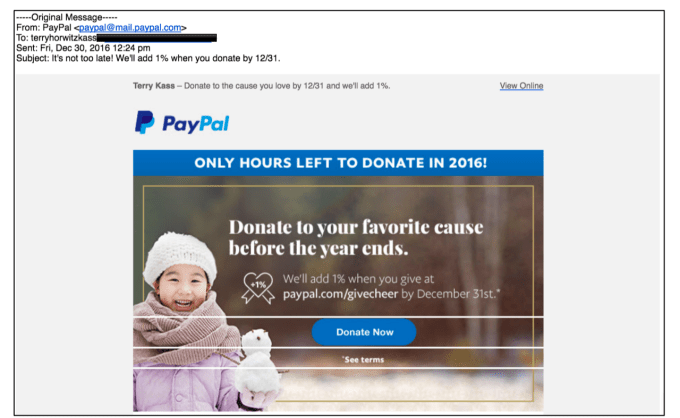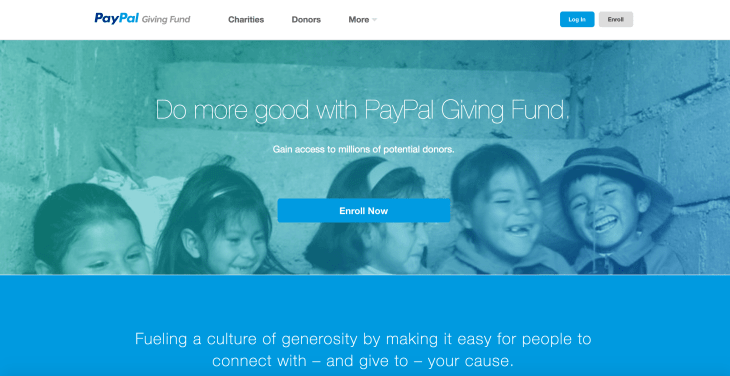PayPal was targeted with a class action lawsuit filed on Tuesday in Chicago which focuses on the way the payments company handles charitable donations. The suit alleges the company’s charitable arm, the PayPal Giving Fund, is misleading consumers who believe they are giving directly to the charities listed on the company’s homepage, but whose funds are sometimes being redirected to different charities without either party’s knowledge.
At the root of the problem is the fact that not all the charities that PayPal features on its Giving platform, and makes searchable through its database, are actually set up to receive donations through PayPal. To accept the funds, the organizations must have a PayPal business account and a separate account with the PayPal Giving Fund.
If they don’t have these, or don’t set them up, then they never receive the donation.
Beyond this, the unregistered charities aren’t being alerted that they’ve received a donation through PayPal or that they need to create an account to accept the money, the suit claims.
This would impact smaller organizations rather than the larger national and international charities, which generally have established PayPal accounts. And the suit suggests that there may be “hundreds of thousands” of smaller charities – those that have the hardest time fundraising – that have not configured a PayPal business account, and could be missing out on these donations.
PayPal lists those charities on its website, even without their knowledge or consent, the suit states.
If the unregistered charities don’t establish accounts or claim the donations within six months, PayPal will redirect the funds to another organization of its choosing, “without regard to the intention, beliefs or desires of the donor,” the suit claims.
Lead plaintiff Terry Kass says she used PayPal’s Giving Fund to donate a combined amount of $3,250 to 13 national and local-level charities, but only three of the charities were actually registered with PayPal, even though all had profile pages on the Giving Fund’s website.
Because of this, only $100 went to the charities Kass had selected, while the remaining $3,150 aimed at local charities was withheld.

Another plaintiff, Friends for Health, is one of the ten charities Kass attempted to donate to, but had never registered for an account with the PayPal Giving Fund. Still, the organization was listed on PayPal’s website to accept donations.
For what it’s worth, PayPal does state on its Giving Fund website that it will only distribute money to those organizations that have a Giving Fund account configured. But these charities still have profile pages, even when that’s not the case. And on these pages, there’s no indication that they’re not registered to receive PayPal donations. Ultimately, this is misleading to consumers.
PayPal’s Donation Delivery Policy also indicates that it does attempt to contact the unregistered charities “at regular intervals for a period of at least six months in order to enroll them.”
The lawsuit alleges this is also not the case, and rather that PayPal’s fund “often fails to provide notice” to the charities without the appropriate accounts.
It states, too, that even when the unregistered charities are alerted to the donations and register for the appropriate accounts, PayPal continues to hold funds for additional time to generate more revenue for itself. (This aspect to the suit is unclear, as it doesn’t say for how long those funds are held. This is key, as bank transfers on PayPal are not immediate.)
Finally, PayPal doesn’t provide the charities with the names and identities of donors, even when they’re not anonymous. But donors believe their funds went through, as PayPal provides confirmations of this, even when the organizations haven’t claimed the funds.
Because of all these issues, the suit says: “PayPal Giving Fund is a failed vehicle for matching donors and recipients, and instead stands as an obstruction to achieving the important goals of thousands of donors and charities worldwide.”
The plaintiffs want PayPal to deliver all the withheld donations to the appropriate charities, with interest where appropriate, and with the promised 1 percent additional donation promised in marketing materials. They also want to be identified to the charity so they can receive updates from the groups in the future, including later successes and other fundraising efforts.
PayPal has long touted the success of its Giving Fund in enabling digital donations to charities. Last month, PayPal said that it had seen 11 percent growth in charitable contributions in 2016 over the prior year, with $7.3 billion in charitable donations over its platform, including over $971 million during the holidays alone. However, these figures are focused on worldwide donations – the Giving Fund’s website states that it processes over $35 million in donations per year for charities only in the U.S. and U.K.
A PayPal spokesperson offered the following comment:
“PayPal only recently became aware of this filing and we are reviewing the contents. PayPal and PayPal Giving Fund foster positive change and significant social impact by connecting donors and charities. We are fully prepared to defend ourselves in this matter.”
Update, 3/2/17, 3:30 PM ET:
PayPal has now issued a new statement on the lawsuit:
“PayPal recently became aware of this filing related to our holiday giving campaign and we are reviewing the contents. To be clear, PayPal Giving Fund has not redirected any of the charitable gifts donated during our holiday campaign. PayPal and PayPal Giving Fund have a long history of fostering significant social impact by connecting donors and charities. We work to ensure as many charities as possible can benefit from our global donation campaigns. When PayPal Giving Fund receives a donation to benefit a charity that hasn’t enrolled, we contact the charity to notify them of the gift and help them enroll. PayPal Giving Fund does not hold any donations in interest bearing accounts, and therefore earns no interest on any charitable donations. We are disappointed by the lawsuit and we are fully prepared to defend ourselves vigorously in this matter.”
